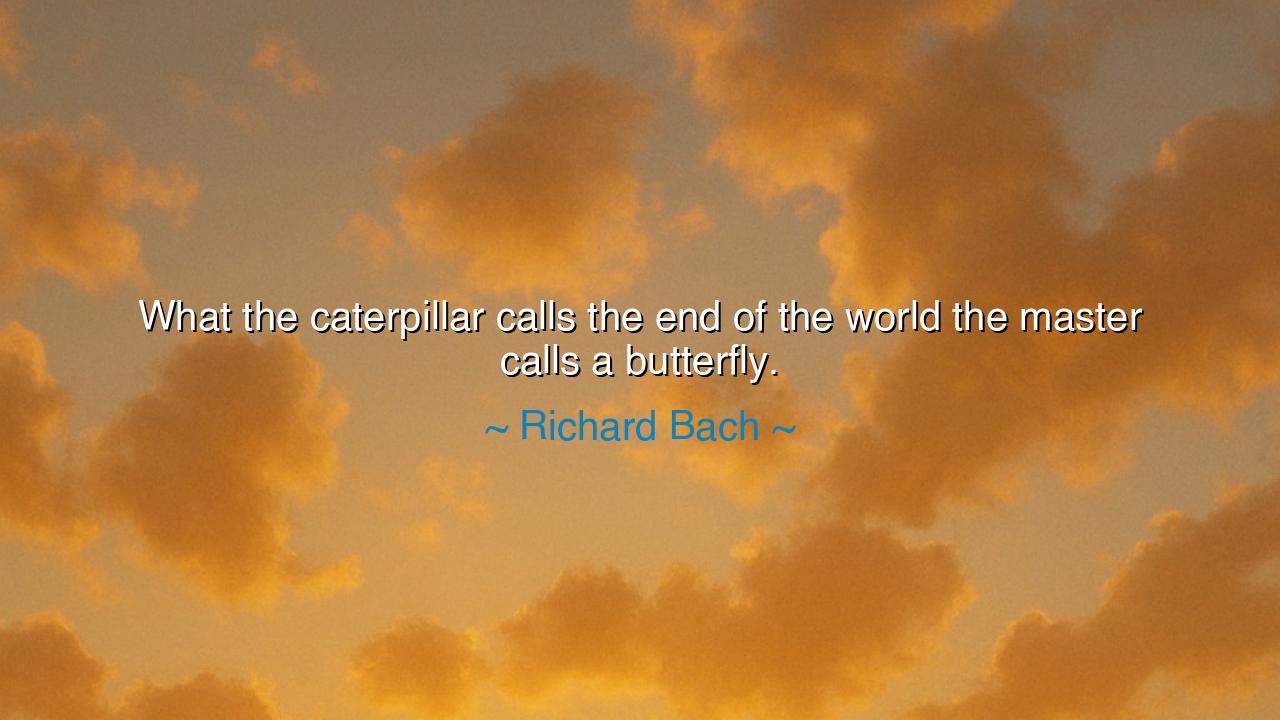
What the caterpillar calls the end of the world the master calls






Hearken, seekers of wisdom, to the words of Richard Bach, who spoke across the veil of transformation: "What the caterpillar calls the end of the world, the master calls a butterfly." In these words lies a meditation on the nature of change, perspective, and transcendence. The caterpillar, confined by its limited understanding, perceives the pain and dissolution of its cocooned world as final. Yet the master, the enlightened observer, perceives not death but metamorphosis, the unfolding of greater beauty, freedom, and potential.
The essence of Bach’s insight is the subjectivity of perception. Life’s trials, endings, and disruptions often feel absolute and terrifying to those who inhabit the moment. Like the caterpillar, we may see loss, failure, or upheaval as an annihilation of hope or purpose. Yet from a broader, wiser perspective, these same events are but the crucibles of transformation, necessary for the soul’s evolution. The end is not annihilation; it is preparation for emergence.
History offers vivid mirrors of this truth. Consider Nelson Mandela, cast into the confines of Robben Island for decades. To him, it may have seemed the end of the world—freedom lost, dreams deferred. Yet this crucible of suffering and reflection became the cocoon from which his spirit emerged, a butterfly of courage, wisdom, and moral authority that would transform a nation. What seemed despair to the moment was, in truth, the prelude to greatness.
Bach’s metaphor extends also to personal growth. The pain of loss, failure, or separation is often the very soil from which resilience and insight grow. Just as the caterpillar must surrender to the dissolution of its familiar form, humans too must sometimes relinquish comfort, certainty, or identity in order to expand, evolve, and soar. The master’s vision teaches patience, trust, and faith in the unseen pattern of life.
Consider the life of J.K. Rowling, whose years of hardship—poverty, rejection, and despair—might have seemed the end of her world. Yet these trials nurtured the depth of imagination, empathy, and perseverance that would give birth to the Harry Potter universe. The despair she endured was not a termination, but the preparation for flight, a cocoon that shaped the wings of her destiny.
The lesson for all is profound: perceive life’s endings not with fear, but with curiosity, openness, and trust. What appears as catastrophe or limitation may be the very mechanism through which your potential is realized. The caterpillar’s perspective is limited; the master’s vision encompasses emergence, beauty, and the unfolding of higher possibility. One must cultivate the wisdom to see beyond the immediate, to recognize transformation where others see demise.
Practically, one must embrace change, surrender to growth, and act with courage. When faced with challenge, pause to consider the broader arc of life, the unseen metamorphosis awaiting beyond the cocoon of difficulty. Trust that endings carry within them the seeds of new beginnings, and that your struggles are not meaningless, but formative and sacred.
And so, let this teaching echo through generations: the end of the world, as perceived in the confines of fear or ignorance, is often but the cocoon of transformation. Embrace the dissolution, endure the struggle, and trust in the emergence of your butterfly. Life’s trials are not punishments, but invitations—to expand, to soar, and to behold the beauty of a self reborn in freedom and light.






AAdministratorAdministrator
Welcome, honored guests. Please leave a comment, we will respond soon